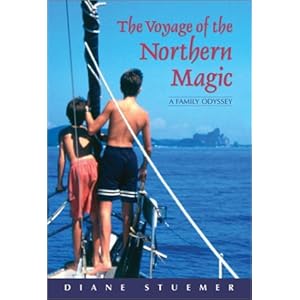The Voyage of
the Northern Magic: A Family Odyssey
By Diane
Stuemer,
McClelland
& Stewart Ltd.,
$37.99, 369 pp.
ISBN:
0-7710-8260-6
Available
through www.nauticalmind.com
and selected bookstores
If family-oriented sailing stories strike you as good Christmas reading, the late Ottawa circumnavigator Diane Stuemer’s tale of a four-year voyage around the planet in a 40-year-old steel ketch makes for solid Yuletide fare. I recently re-read a bit of this book, which I had bought when it first came out, and it's still a hell of a tale.
Herbert and Diane Stuemer, self-described as a typical suburban family with three sub-teen boys, found that the onset of middle age and Diane's brush with cancer were all the motivation they needed to uproot themselves and to follow a windborne dream.
Essentially an
impulse buy for the Stuemer family, their aged 42-foot Dutch ketch , which would be renamed Northern
Magic, would prove to be a sturdy, if not luxurious, home for the five-member
family on their west-about passage. Before leaving, Diane Stuemer cleverly
contracted with an Ottawa daily paper to provide updates on the voyage; not
only did this spur enormous local interest in—and assistance for—their voyage,
but it provided Stuemer with a basis for her book, the slick web site dedicated
to their trip at www.northernmagic.com,
and what appeared to be a burgeoning career for herself as a motivational
speaker.
That career was unfortunately cut short in 2003 when Stuemer's melanoma flared up again into cancer. I saw her speak a few weeks before she died, and she was a very positive person. Her story was inspiring, but also a cautionary tale: my wife and I have, unlike herself, striven to prepare ourselves to equal and complementary skill sets and to gather diverse yacht-handling experiences. A handyman skipper like Herbert Stuemer, no matter how high his own level of skill, with kids aboard and an initially new-to-sailing wife yielded no foundation in safety for running their boat: there are hair-raising early trials that underlined this for my wife and I in big, red-ink strokes.
Diane Stuemer possessed a degree in journalism and, before becoming 'first mate' on Northern Magic, a
career in advertising. Both skill sets facilitate her telling of a tale of
adventure that fairly crackles off the page. Stuemer and her husband decided to
world cruise essentially on impulse, and both had to muster up a great deal of
enthusiasm and positive thinking to overcome some of the hurdles the seas, the
vessel and the inhabitants of various ports threw at them. My heart went out in
particular to Herbert Stuemer, the father and 'captain' of Northern Magic.
As as a former renovator and technical teacher and all-around Mr. Fixit, he by
default performed the seemingly constant repairs and adjustments needed on the
old boat. I lost count of the number of times he seemed to be installing yet
another rebuilt alternator upside down in the bilge during a nausea-making
gale. Commendably, Stuemer isn’t shy about saying what equipment worked like a
charm…and which failed miserably. As for the boat itself, old steel Dutch
ketches seem a bullet-proof choice for the inexperienced sailor. As can be seen on this blog's boat rebuilding sister, The World Encompassed, I took some of those ideas of "pilothouse" and "steel" to heart when we bought Alchemy, our steel pilothhouse cutter, in 2006. All credit to Northern Magic on that score.
Speaking of
equipment issues, it’s interesting to compare the Stuemers’ story with a
similar one from 15 years further in the past: the voyage of Paul Howard and Fiona McCall’s Lorcha.
As told in two popular books from the ‘80s, the circumnavigation of Lorcha
seemed by contrast to the Stuemers to be more relaxed, possibly because of the
greater experience of the sailing couple, and probably because the earlier
boat’s most complex gear was a SatNav. Northern Magic, due to Diane
Stuemer’s journalistic needs and the requirements to keep the kids occupied with electrons,
featured laptops and e-mail, radar and GPS and a lot of gear not available to
or generally desired by the smaller boat and crew of Lorcha a mere 15 years earlier.
Another difference between the '80s and our new century is that it’s a nastier
world for cruisers these days and wasn't that different at the turn of the millennium. Stuemer relates problems with bureaucracy-mad
officials, pirates in the Red Sea, and even an unwanted, ring-side seat to Al
Qaeda terrorism. On the plus side, however, Stuemer found her family becoming
gradually involved in the often impoverished lives of the folk they met. This
has led to the long-term support of orangutan habitat preservation in Borneo,
and paying for the education of some young people in Kenya. This is the best
part of Stuemer’s narrative, in my opinion: how cruising eventually took her
away from her own concerns and gave her a broader view of the world, one in
which even a limited effort could make a great difference. That alone takes
this tale well beyond tourism.

No comments:
Post a Comment